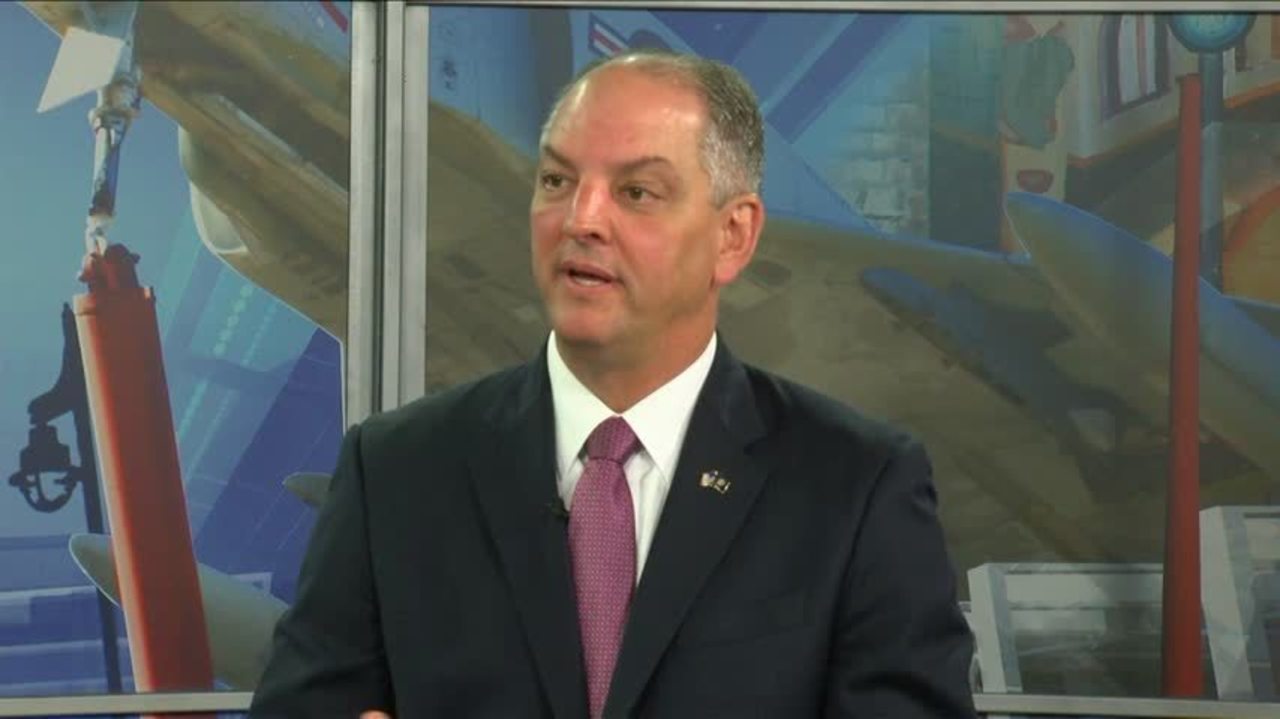
Thanks to Democrat Governor John Bel Edwards’ failed economic policies, Louisiana’s business climate continues to decline as employers relocate across the border to Texas.
Rolfe McCollister, publisher for The Greater Baton Rouge Business Report penned a scathing new column blasting Edwards’ changes to Louisiana’s Industrial Tax Exemption Program (ITEP), writing that his policies have forced 55,000 workers out of Louisiana, with many going across the border to Texas, a state which boasts a much friendlier business climate under GOP Governor Greg Abbott. Economist Loren Scott agreed, calling Edwards’ changes “the best economic development move I have ever seen by any Louisiana governor—for the state of Texas.”
With Governor Edwards’ disastrous policies costing Louisiana much-needed jobs and capital, it’s no surprise that CNBC ranks the state in the bottom ten for business climate under his leadership. Louisiana deserves better.
Rolfe McCollister writes for The Greater Baton Rouge Business Report:
“Fallout from the controversial changes made some two-plus years ago by Gov. John Bel Edwards to the long-standing Industrial Tax Exemption Program (ITEP) has been building for some time. Turning over power to each parish on the exemption of local property tax dollars may have seemed like a good idea but be careful what you wish for Gov. Edwards.
Actions and decisions have consequences, as we witnessed last week with the East Baton Rouge Parish School Board and ExxonMobil. Not only could Exxon’s ITEP rejection have long-term ramifications for our local economy, but the school board’s decision also sends the wrong message to other businesses and industry looking to locate or expand in Louisiana.
Following the school board’s decision, local ExxonMobil officials issued a statement saying, ‘Due to the uncertainty, we will have to assume there is no ITEP incentive as we make cost projections on future investment opportunities in Louisiana.’
Their statement went on to add, ‘This may include a reduction in investments that grow jobs, expand operations or support community projects. Our hope is that the current business environment will change to help us bring investment and jobs to this region when we need it most.’ I agree.
At the same time, left-wing activist group Together Baton Rouge—made up of mostly Democrats, teacher union members and some from the faith based community—is celebrating the ExxonMobil’s retraction, claiming there is finally ‘predictability of a genuine standard.’
Hogwash. There is nothing predictable when you have three groups in each parish making decisions and all of them are elected, including the members of our illustrious school board and Metro Council.
Many of these politicians are only concerned by the loud noise in their ears from TBR. This group is a threat to our economic future and has done little to bring us ‘together.’
Did you know that ExxonMobil is in the top 10 of Fortune 500 Global (No. 9)? This is the No. 1 corporate citizen in East Baton Rouge and the largest property tax payer. Their impact has been enormous—and continues to be—since the days my father was a student at Istrouma. Economist Loren Scott pointed out the facts in a letter to The Advocate last April about a 2018 report on the economic impact of ExxonMobil’s four facilities:
- Employs 6,915 employees and contract workers at an average wage of $74,158 a year—51% above the average wage in this parish.
- For the past 10 years, the company has invested in excess of $250 million a year in capital spending at local plants.
- Taking into account the multiplier effect, every 10th job in the parish can be traced back to four local plants.
- In 2017, ExxonMobil paid East Baton Rouge Parish $32.7 million in property taxes, two and a half times more than the second-ranked payer, Entergy. No other company in the state writes a check that large to a parish government.
- Adding in direct and indirect sales taxes generated through the multiplier effect, ExxonMobil produced $88.5 million for the local government—enough money to pay the salaries of 58% of the public school teachers in the parish.
- In 2017, ExxonMobil and its employees contributed $1.4 million to the Capital Area United Way, about 14% of CAUW’s total collections and the largest from any entity in the region. The ExxonMobil Foundation contributed $1.1 million to LSU and Southern University last year, and the company and its employees and retirees contributed $4 million to Baton Rouge area nonprofits and schools. I appreciate and applaud their generosity, and thank them for all they have invested here and jobs created.
Yes, ExxonMobil has benefited much from being in Louisiana and along the Mississippi River near LSU, and it has received substantial tax incentives. But, as Scott points out, Texas beats Louisiana in so many categories that the incentives are key to being competitive and attractive for expansion. The numbers have to work in such a capital-intensive industry.
It is disappointing that five school board members, including a lone conservative Republican, David Tatman, rejected ExxonMobil so they can get more money to cover their large annual deficit—which they like to blame on others versus their own performance. But what type of results does ExxonMobil get now for the millions they pay in taxes?
A skilled and educated workforce? Not.
Reaction was quick last week to the rejection and response from ExxonMobil.
• Mayor Sharon Weston Broome recognized the risk to the parish, saying, ‘My administration has consistently supported ExxonMobil, and I will continue to do everything in my power to see that they are able to grow and prosper in Baton Rouge. Exxon has been part of the fabric of this community for generations and I believe that will continue to be the case.’ (She may ‘believe’ but I would advise she makes sure and explains that to TBR.)
• The Baton Rouge Area Chamber was direct: “ExxonMobil’s decision and statement today is a wake-up call. ExxonMobil has been the picture of corporate partnership, and extremely generous in their support of community groups, charities and nonprofits, most significantly to education and education charities. Nonetheless, community activists have targeted the ITEP program and this one company in particular with their derision, attacks and misrepresentations, fueling an anti-business sentiment today in our community.
‘Now, if we look ahead 15 years, what will we have? Will we continue to antagonize this industry, continue to tell them to stop investing? Will we see manufacturing decline again, only to shrink our tax base and jobs?
‘What signal will Baton Rouge send now?’ (Gov. Edwards, I think that’s a question for you.)
It was ironic that the ExxonMobil news broke on the same day that Gov. Edwards announced for re-election, touting all the ‘progress made.’ ITEP was raining on his parade and rightfully so. Adding to the pain was news earlier this month that Georgia-Pacific, Thompson Pipe Group and BASF would reduce its Baton Rouge workforce or close, impacting nearly 1,000 jobs. Not a good way to start the last year of your term.
Look, the ITEP program has been around a long time and is not ideal, but the governor has made it worse. Sadly, unless he admits he made a mistake, we have to live with it—for better and worse—until a governor and the Legislature show the courage to fix a ridiculous and anti-business tax code.
Until then we live with Gov. Edwards’ ‘Texas Plan’ that was evident in a post by Baton Rouge ex-pat Branon Pesnell, who now does real estate in Houston: ‘I am one of the 55,000 who moved out of the state (2016-2018) partly because of this type of short-sighted thinking. Decisions like this will have long-term impact on the Louisiana’s ability to recruit and keep business. The door is open in Texas, come on in!’”





See the latest videos from RGA
Watch our videosI want to congratulate @POTUS, Senators @berniemoreno and @SenJonHusted, and Ohio’s Congressional delegation for today e…
Hardworking Mississippi taxpayers are the winners today!!
Thank you @SpeakerJohnson!
Thank you @RepTrentKelly @RepMichael…
Follow RGA on Twitter
Follow RGA on Facebook